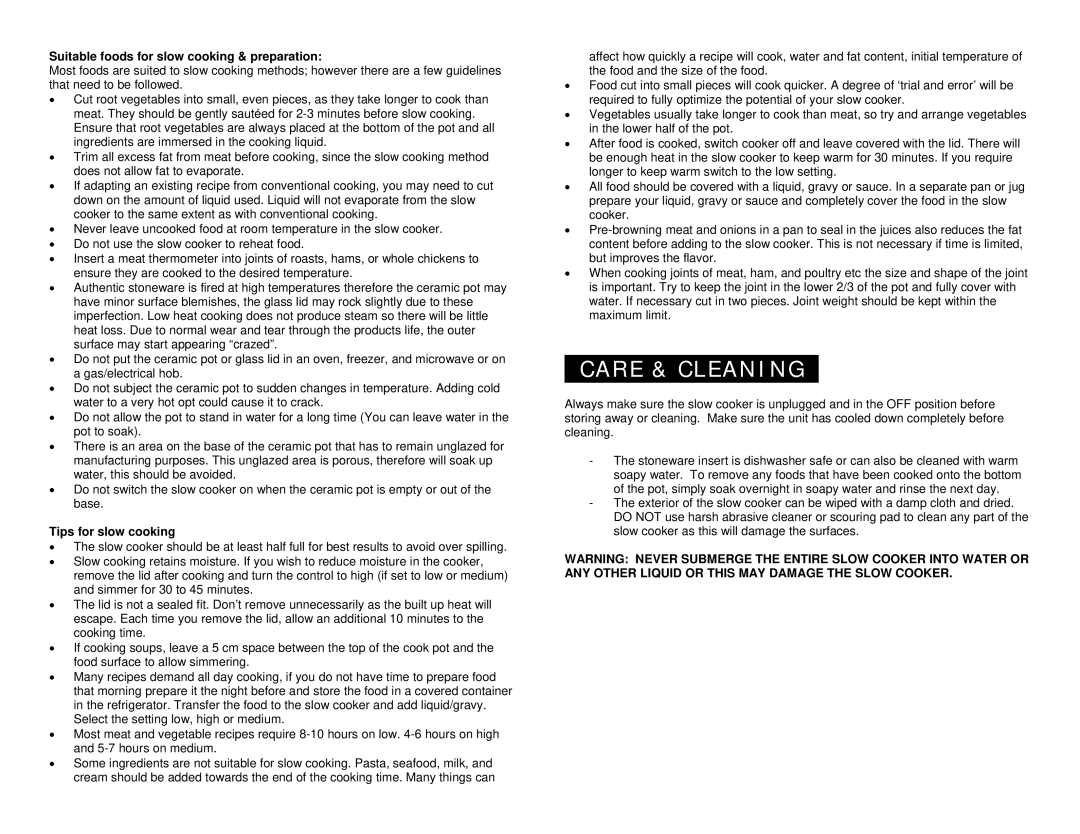Suitable foods for slow cooking & preparation:
Most foods are suited to slow cooking methods; however there are a few guidelines that need to be followed.
•Cut root vegetables into small, even pieces, as they take longer to cook than meat. They should be gently sautéed for
•Trim all excess fat from meat before cooking, since the slow cooking method does not allow fat to evaporate.
•If adapting an existing recipe from conventional cooking, you may need to cut down on the amount of liquid used. Liquid will not evaporate from the slow cooker to the same extent as with conventional cooking.
•Never leave uncooked food at room temperature in the slow cooker.
•Do not use the slow cooker to reheat food.
•Insert a meat thermometer into joints of roasts, hams, or whole chickens to ensure they are cooked to the desired temperature.
•Authentic stoneware is fired at high temperatures therefore the ceramic pot may have minor surface blemishes, the glass lid may rock slightly due to these imperfection. Low heat cooking does not produce steam so there will be little heat loss. Due to normal wear and tear through the products life, the outer surface may start appearing “crazed”.
•Do not put the ceramic pot or glass lid in an oven, freezer, and microwave or on a gas/electrical hob.
•Do not subject the ceramic pot to sudden changes in temperature. Adding cold water to a very hot opt could cause it to crack.
•Do not allow the pot to stand in water for a long time (You can leave water in the pot to soak).
•There is an area on the base of the ceramic pot that has to remain unglazed for manufacturing purposes. This unglazed area is porous, therefore will soak up water, this should be avoided.
•Do not switch the slow cooker on when the ceramic pot is empty or out of the base.
Tips for slow cooking
•The slow cooker should be at least half full for best results to avoid over spilling.
•Slow cooking retains moisture. If you wish to reduce moisture in the cooker, remove the lid after cooking and turn the control to high (if set to low or medium) and simmer for 30 to 45 minutes.
•The lid is not a sealed fit. Don’t remove unnecessarily as the built up heat will escape. Each time you remove the lid, allow an additional 10 minutes to the cooking time.
•If cooking soups, leave a 5 cm space between the top of the cook pot and the food surface to allow simmering.
•Many recipes demand all day cooking, if you do not have time to prepare food that morning prepare it the night before and store the food in a covered container in the refrigerator. Transfer the food to the slow cooker and add liquid/gravy. Select the setting low, high or medium.
•Most meat and vegetable recipes require
•Some ingredients are not suitable for slow cooking. Pasta, seafood, milk, and cream should be added towards the end of the cooking time. Many things can
affect how quickly a recipe will cook, water and fat content, initial temperature of the food and the size of the food.
•Food cut into small pieces will cook quicker. A degree of ‘trial and error’ will be required to fully optimize the potential of your slow cooker.
•Vegetables usually take longer to cook than meat, so try and arrange vegetables in the lower half of the pot.
•After food is cooked, switch cooker off and leave covered with the lid. There will be enough heat in the slow cooker to keep warm for 30 minutes. If you require longer to keep warm switch to the low setting.
•All food should be covered with a liquid, gravy or sauce. In a separate pan or jug prepare your liquid, gravy or sauce and completely cover the food in the slow cooker.
•
•When cooking joints of meat, ham, and poultry etc the size and shape of the joint is important. Try to keep the joint in the lower 2/3 of the pot and fully cover with water. If necessary cut in two pieces. Joint weight should be kept within the maximum limit.
CARE & CLEANING..
Always make sure the slow cooker is unplugged and in the OFF position before storing away or cleaning. Make sure the unit has cooled down completely before cleaning.
-The stoneware insert is dishwasher safe or can also be cleaned with warm soapy water. To remove any foods that have been cooked onto the bottom of the pot, simply soak overnight in soapy water and rinse the next day.
-The exterior of the slow cooker can be wiped with a damp cloth and dried. DO NOT use harsh abrasive cleaner or scouring pad to clean any part of the slow cooker as this will damage the surfaces.
WARNING: NEVER SUBMERGE THE ENTIRE SLOW COOKER INTO WATER OR ANY OTHER LIQUID OR THIS MAY DAMAGE THE SLOW COOKER.
